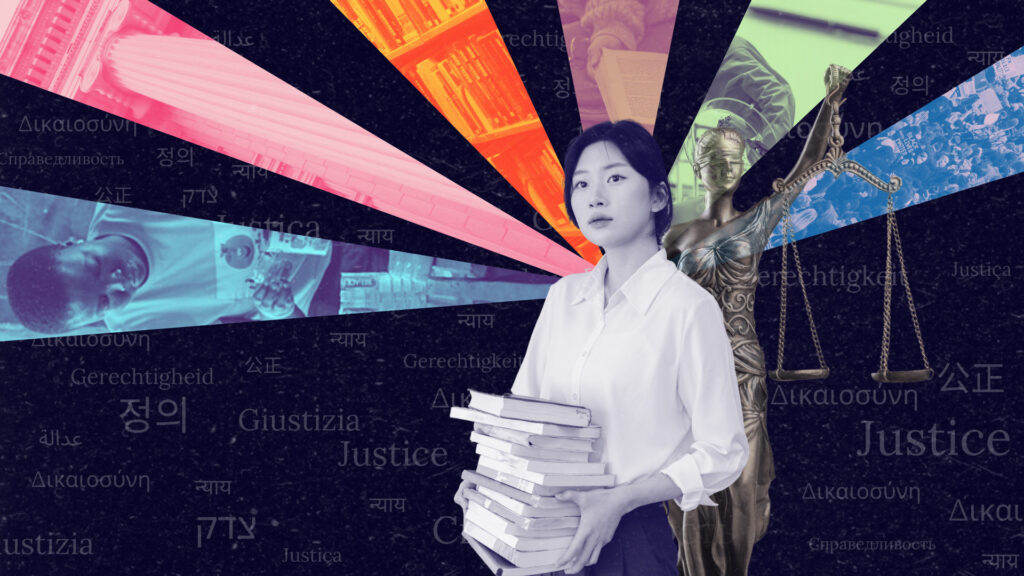University professors have a certain cultural privilege. They have been granted an elevated status, access to intellectual resources and networks, and the backing of a large educational institution, an academic guild, and maybe government or corporate grants for research. They have expertise and they are cultural influencers. They also have students, and maybe even some real disciples who follow in their scholarly footsteps like those 12 men did with Jesus, whom they called ‘Teacher’ and ‘Master’.
Common Motivations for Christian Scholars and Teachers
Careerism
Professors can seek to make a name for themselves, which includes recruiting those eager disciples, but also securing large grants, being published by the bigger presses, and getting the better academic positions. There is nothing wrong with any of those things, but as ends in themselves they can be self-serving and well, small. Our broken world cries for scholars who care about the state of the planet and its peoples.
Nationalistic fervor
Academics seek to further the development, health or prosperity of their own nation. Again, there is nothing amiss when we seek the welfare of the political community to which we belong, but I would argue that the geopolitical, environmental, and economic reality is that we are increasingly and utterly interdependent on each other as nations on this planet, and so nationalistic aims can become self-serving and tribal.
Here is the incontrovertible fact: we live in a globalized world, and the flows of information, currency, resources, and people, as well as conflicts and viruses across borders requires the responsible scholar to widen the scope of his or her imagination to include at least some transnational consideration and pursuits. Our campuses are international hubs already, teeming with international students—for decades if not centuries. We at Global Scholars Canada are passionate about the cosmopolitan nature of the campus, and so we send and equip Christian scholars to be a redemptive influence in cross-cultural settings, especially in under-serviced areas of higher education around the globe.
we live in a globalized world, and the flows of information, currency, resources, and people, as well as conflicts and viruses across borders requires the responsible scholar to widen the scope of his or her imagination to include at least some transnational consideration and pursuits
Testimony
Now, Christian motivations for a global imagination and Christian cosmopolitanism can be manifold. I believe most Christians who take the practice of their faith seriously would see testimony as an important aspect of cross-cultural service in education. We bring our experience of God, our understanding of the gospel, our theological tradition to share with others we meet in our scholarly activity across borders.
Aid, relief, and development
I would also suggest that most Christian scholars understand the importance of Christ’s calling to love your neighbour and share the resources and wealth that we have, including infrastructure development, material goods, medical expertise, food security and especially education. Jesus himself made a ministry of healing, feeding and teaching people.
A Global Imagination for Academic Vocation
What I want to explore here are three other motivations for cross-cultural scholarly activity that are less often discussed in some Christian circles—justice, spiritual formation, and worldview engagement. I will do so referring to some of the work of Global Scholars Canada (GSC).
Justice—Brain Drain

Brain drain is typically understood as the growing trend of educated, emerging leaders from developing countries emigrating to foreign nations that offer better vocational opportunities, higher pay, and more desirable living conditions. In other words, as GSC scholar in Sierra Leone Stephen Ney says, ‘When African scholars aspire to undertake “better” opportunities in the West, their home country loses its brightest and best champions for local justice and peace.’
I’ve looked most closely at Africa in this regard, and there is a human flight and brain drain index on TheGlobalEconomy.com, that rates the extent of educated migration out of a country. Here it registers that while Canada sits at 0.7 and the USA at 1.7, most African nations range between 4 and 8.7 on a 10-point index. This clearly suggests the unequal distribution of educated persons across the globe. While some migration does facilitate knowledge flow, and many who find jobs in the West send money and intellectual network opportunities back to the home country, the net result is loss for the poorest countries and gain for the wealthy Western nations.
As scholar George Odhiambo reports,1 ‘the number of Africans heading out of the continent was small during the 1960s, but later increased due to the deterioration of social, political and economic conditions. It is estimated that 27,000 highly educated Africans migrated to developed countries between 1960 and 1975, increased to 40,000 annually during the following decade, peaked at about 80,000 in 1987 but has leveled to about 20,000 a year since 1990.’ The effects of this, Odhiambo argues, are seen in the decline of intellectual life in Africa. One institution in Nigeria says 70 percent of its promising academics leave the country.
How to mitigate brain drain? Our Global Scholars theologian John Span in South Africa says they need ‘African money to free up African scholars to write in the African context’.
So organizations like Global Scholars Canada try to turn the tide and send Western scholars in the other direction. We also send scholarship money to Africa to enable students to attend local universities and learn about African ways and needs and so become African scholars and leaders. GSC supports a Christian studies program at the University of the Gambia—the national university—with a goal to cultivate Christian leaders in that country for that country.
Spiritual Formation—Reciprocal Education

We exist in an age that seeks to unravel centuries of colonization, and especially its deep sense of paternalism, xenophobia, and attitude of cultural superiority. Not all mission has been colonial, and some has been anti-colonial; still, we seek to root out any invisible colonial vestiges. Not out of shame, but out of a sense of responsibility for what we have inherited.
Transcultural mission therefore needs to alter its posture. David Smith’s Learning from the Stranger: Christian Faith and Cultural Diversity (2009) urges the reader not to see cross-cultural interaction in instrumental terms—in order to achieve some competitive or missional goal—but as a process that itself involves our own discipleship and spiritual growth. The cross-cultural interaction itself is part of our personal journey to spiritual maturity. Encountering different people and cultures will challenge us, change us and hopefully grow us up in our faith, hope, and love. Missiologist Lesslie Newbigin often said that inter-cultural activity is necessary not only for the salvation of those who have not heard the gospel, but also for those who bear witness to it as well.
The cross-cultural interaction itself is part of our personal journey to spiritual maturity. Encountering different people and cultures will challenge us, change us and hopefully grow us up in our faith, hope, and love.
A GSC scholar placed in China came back to Canada after 20 years of service in a university there. He had been a professor and teacher there, but he was also a student of the culture—you have to be. He told me, ‘One thing I learned in China is that you have to honour your father and mother. I’m coming home to take care of my aging parents.’ Confucian custom helped him obey the ten commandments better.
World religions theologians Terry Muck and Frances Adeney in their world religions textbook Christianity Encountering World Religions offer the approach they call ‘giftive mission’. They suggest the primary biblical metaphor for understanding missions is that of being a bearer of a free gift—and also the receivers of gifts. At its heart is the gospel’s message—that we have life and a future by grace alone, and this comes from God, who is the source, the guide, and the goal of all people. Mission is mutual giving and receiving.
A rather assertive African graduate student said to me a few years ago, ‘We have things to teach you, too. We don’t need you to come and teach us. We need you to come and listen.’ Cross-cultural academic journeys are always a reciprocal education.
At the very least, scholars have to learn the language and culture of their host. GSC hosted a Zoom gathering for some graduate students in engineering from Cameroon last February. They were showing us their research into traditional African methods of home construction and resource extraction (mining) and they explained the value of these traditional methods, including their openness to spiritual integration and matters of sustainability.
As most professors are ready to admit, teaching is itself a learning experience. Lecturing others can be a type of spiritual formation. Going to another country to research or teach is a double-layered learning experience, and necessary for a decolonizing age.
Worldview Engagement—Dialogical Pluralism

A third motivation for a global imagination for scholarly vocation is worldview engagement. Now worldview is defined in a seminal text on the matter by Albert Wolters called Creation Regained as ‘one’s comprehensive framework of basic beliefs about things’.
Our worldview answers questions like: Where do we come from? Where are we now? What is the problem? What is the solution to that problem?
I mentioned we have scholars at the University of the Gambia. The Gambia is 95 percent Muslim, and so it is important for our scholars and students to understand Islam and an Islamic worldview. In Islam, the problem with the world is ignorance, and the solution is found in guidance: the Quran, the Hadith, and the five pillars of Islam. Christianity, by contrast, claims we aren’t only ignorant, but thoroughly lost and broken, and the only hope we have is in God’s grace in Jesus Christ.
I teach World Religions at a local Christian university here in Canada. We often start the class with this little proverb: ‘He does not know Canada who only Canada knows.’ Christians come to understand their own faith better when compared and contrasted with another faith, especially when done with some depth and honesty. This is part of the natural curiosity of a Christian scholar but also part of the responsibility of a Christian scholar in a cross-cultural situation: to ask, what are the stories here, how do they lend themselves to a worldview, and what can the Christian worldview offer that can help lead to flourishing for the institutions and nations of which I am a guest and citizen?
We ask questions of our hosts: What do people love in this culture, and what are the stories and practices that shape that love? Worldview is always embodied, practised—you might say in philosopher James K. A. Smith’s terms: liturgical. It comes in set scripts for action that everyone seems to know and to follow.
A Christian professor is always found at the cross-currents of a variety of contrasting worldviews and should facilitate a robust and principled pluralism that gives space for other worldviews while taking space for Christian worldview. The university, if it is to be a place of learning, must be a place for the confrontation and contrast of worldviews, what Christian philosopher Nicholas Wolterstorff called dialogical pluralism. Every kind of scholar can be at the table, and there we reason with each other to understand each other better and teach our students the importance of worldview, and especially a Christian worldview.
The university, if it is to be a place of learning, must be a place for the confrontation and contrast of worldviews,
Cosmopolitan Sensibility
So in summary, Christian professors live with privilege in a globalized world, and most will agree that cross-cultural testimony sharing, and international development work are important motivations for a globalized academic imagination, but I have argued here that social justice, spiritual formation, and worldview engagement are also worthy motivations for such transnational sensibilities, pointing us to the hopeful option of brain gain in a brain drain system, the decolonizing impetus of reciprocal education, and worldview engagement.
What I would commend is the desire for a thick sense of Christian cosmopolitanism, a sense of being a world citizen pursuing a World Christianity, which has become its own specialized term now. World Christianity tells us Christianity is not Western, but diverse, decentralized, and belonging to no singular people.
Resources
- David Smith. Learning from the Stranger: Christian Faith and Cultural Diversity (Grand Rapids, MI: Wm. B. Eerdmans Publishing Co., 2009).
- Terry C. Muck, Frances S. Adeney. Christianity Encountering World Religions: The Practice of Mission in the Twenty-first Century (Ada, MI: Baker Academic, 2009).
- Albert M. Wolters, 2nd ed. Creation Regained: Biblical Basics for a Reformational Worldview (Grand Rapids, MI: Eerdmans, 2005).
Endnotes
- George O. Odhiambo, “Academic Brain Drain: impact and implications for public higher education quality in Kenya,” Research in Comparative and International Education, Volume 8 Number 4, 2013. www.wwwords.co.uk/RCIE

